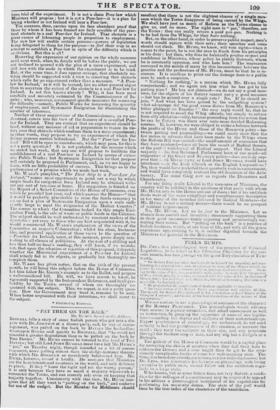PEEL'S BUMPS.
DR. EPP.i, in a phrenological view of the progress of Criminal Legislation, to Le Lund in the Christian Phy.sician for the car- relt mouth, has this iassage on the great Tory charlatan of Tam- worth.
Sir Hobert Feei has talc:: t1;,7. relit to Larself for amending and ame-
liorating t:y et in,hati anti. in c..cc to some of time :nlences alie.1.1, re- f,..rreii to, the 1.);:o,, , s l • ,. nnieli-plaised enien‘Litions. Sleal- iax to the value i.f •Haim &Atli : lie nude it to time amount of ; which act ii . •,! t!.e value thetime of Once:1.11m., .!, , 7 7 :r instea i ui iir.leashig the value of 1.11.1:1•S life, he dimiui-Lr.i i.
" He perpetuated the putii-"..:ent of death a, applicable to fsw;eries.
" An exaiii:nei.in of Sir Peel's tir,;aitization explaia thin.
Time speech Sir Robert Pei:: a.: his Ly:.1 !tern:- of the odt.g.w 1 uicerein, iniuriis one of the beet i}41,trations of the thaure of that olg lineation."
We are curious to see a plirenologieal estimate of the character of Sir ROBERT PLAUSIBLE. The phrenologists would advance their science in popular estimation, and afford amusement as well us instruction, by guag:ng the capacities of some of our legisla- tors—sounding the depths and shallows of their understandia;s. Expert practitioners of craniology, we understand, do not need actually to feel the pratuberances of the criminal, or measure the skull : they carry the callipers in their eye, and can penetrate through the thickest crop of hair, add any wig but a J edge's or a Bishop's.
The gallery of the House of Commons would be a capital place for surveying the skulls of senators when they dud- their hats to address the House ; and a ciue might thus be pt to the occa- sionally inexplicable freaks of some few well-meaning men. The t hing has been done a iready,we believe, in a few individual eases; but Dr. EPPS, who iliustrates his le,_eures on phrenology with living examples in public men, shouid follow out the exhibition regu- larly on a large EC.11..I.
\1' Ito knows, but at some future time, not very distant, a candi- diLe for the suffrages of a constituency inay be required to append to his address a phrenological testimonial of his capabilities for performing his senatorial duties. The state of the poll would then be the true index of the characters of the candidates.


























 Previous page
Previous page